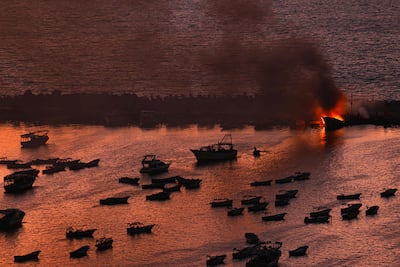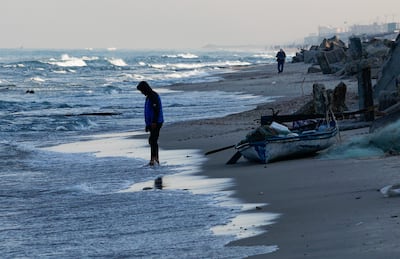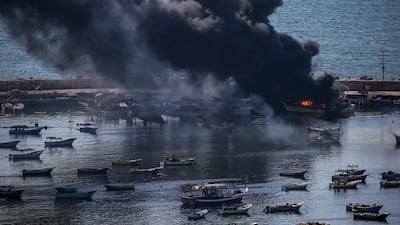Live updates: Follow the latest news on Israel-Gaza
Calm amid the constant sound of war, the Mediterranean on Gaza’s shores stands out as the only sight that hasn't been sabotaged by the Israeli army.
It not only represents a source of livelihood for Gaza's fishermen but is also a symbolic part of the city's identity.
“I have been working in the fishing profession for 30 years. We have never experienced days like these before,” Ibrahim Al Ra'I, a fisherman, told The National.
Mr Al Ra'I is now displaced from western Gaza to the Jabilia refugee camp, one of the older camps in Gaza which, like most of the densely populated enclave, has been heavily bombed.
After a brief truce last year, the Israeli army withdrew from the beachside camp, allowing Mr Al Ra'I to venture to the sea for short distances and catch some fish.

The risks were high, and the army targeted them more than once – Israeli patrol boats are often close to the shore while drones hover above Gaza almost constantly. However, driven by hunger and the need to feed their children, Mr Al Ra'I and a few other fishermen insisted on going down to the sea.
“For more than a day, we sold fish, but unfortunately, prices were high compared to normal days because the quantities were limited,” Mr Al Ra'I said.
The impact of the war on the fishing sector was severe, with boats destroyed and equipment lost, turning the sea from a source of livelihood into a great danger.
Hani Rizq now lives in Al Shatee Camp in Jabilia, after the Israeli army asked residents west of Gaza city to flee.
“During the ceasefire, we were able to reach the sea and the port for the first time. We saw how the army destroyed everything related to fishermen,” Mr Rizq told The National.
Large boats and valuable equipment were all destroyed, indicating an intention to devastate the entire fishing sector.

Returning to Al Shatee after the ceasefire, Mr Rizq and his family sought refuge in schools as their homes were significantly damaged. Despite the challenges, they went back to the sea to fish, selling their catch to provide for their children.
The division of the Gaza Strip into zones of conflict by the Israeli army has created food and aid shortages, with the North particularly affected.
Yahya Ghubayin, from the overcrowded and bombed Jabilia camp, was also determined to reach the sea daily if only for a brief sense of escapism from months of war. He highlighted the sea as the only constant in Gaza, contrasting with the destruction behind him.
“I finally reached the sea after four months, following the withdrawal of Israeli forces from parts of northern Gaza, leaving behind a scene of massive and terrifying destruction,” Mr Ghubayin shared with The National.
Upon reaching the sea, he observed traces of Israeli soldiers, their discarded food scattered along the shore. Undeterred by the scorching weather, he and three others made the decision to go swimming.
“As my body touched the water, I felt a connection to Gaza and its sea, something we were deprived of for so long. The seawater was warm, and we relished in the joy of swimming. However, our ability to venture far was limited as the presence of Israelis in front of us posed a potential threat,” he added.
“Turning my face towards the sea, I found the only unchanged element in Gaza. Yet, behind me lay the devastated Gaza, a heartbreaking sight.”
Reflecting on the past, Mr Ghubayin said “before the war, the beach thrived with life, beauty, restaurants and cafes. Today, it stands as a landscape of destruction and ruins, marked by many horrific scenes. Despite all this devastation, I will personally continue to cherish and visit the sea of Gaza.”


